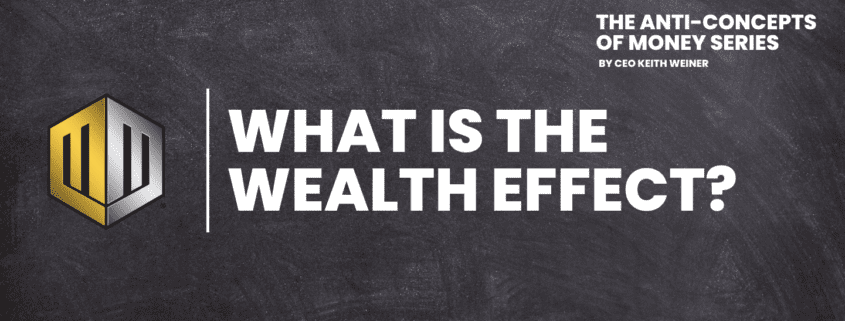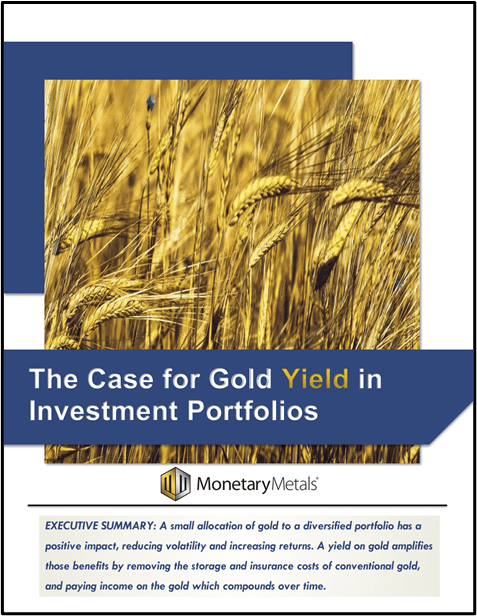The Anti-Concepts of Money: Wealth Effect
If you’ve read the Purchasing Power and Inflation essays from this Anti-Concepts of Money Series we can now discuss the Anti-Concept of The Wealth Effect.
The Anti-Concept of The Wealth Effect
Here is the definition of wealth effect from Wikipedia:
“The wealth effect is the change in spending that accompanies a change in perceived wealth.”
Two different things are bundled into one term. Wikipedia actually states it clearly:
“People typically spend more overall when one of two things is true: when people actually are richer, objectively, or when people perceive themselves to be richer—for example, the assessed value of their home increases, or a stock they own goes up in price.”
Got that? If someone really gets richer, or if he only feels richer, let’s pretend these are the same thing! The peddlers of this rubbish do not openly assert this as a proposition we can examine. They smuggle it via a definition.
Earning Money vs Rising Asset Prices
One cannot argue it’s wrong by trying to say that house prices don’t rise, or that rising house prices don’t cause people to spend more. One must do it the hard way: argue that earning money is not the same as one’s house going up, which is called the wealth effect.
This sheds some light on an interesting point. In any other realm, when the government tries to force people to harm themselves, they resist in every way they can both legally and otherwise. An extreme example is when rent control forced landlords in New York to lose money. They gave their buildings to the city, and the Bronx became a ruin.
Profitably Consuming Capital
Monetary policy is different. It can incentivize people to consume capital, as it has since 1981. Make no mistake. There is no transfer from the poor (who don’t have any capital) to the rich. Not from the middle class (who also feel richer, as their homes and retirement accounts are going up). People are feeding each other capital, to consume. Incredibly, this is profitable.
Speculators, each in turn, buy an asset then sell it at a higher price to the next speculator. Their gain comes from the next speculator’s capital, and they spend it. Which adds to GDP.
The wealth effect is an illusion. It’s like watching David Copperfield cut his assistant in half and then make her disappear. Of course she is not really harmed, and she did not really disappear. It’s just a trick involving mirrors, false bottoms, and clever misdirection.
The wealth effect is just a trick involving rising asset prices, speculation, and clever misdirection.
Can We Print Wealth?
If you told people that the Fed can print real wealth, most would say you’re wrong. They assume that money is like a pizza. If you divide it into more slices, then each one is smaller. So printing money simply dilutes the value of all extant dollars, thus reducing their purchasing power proportionally, which is inflation.
This theory provides a nice, neat argument against the proposition that the wealth effect causes capital consumption. The Fed—according to this view—cannot increase anyone’s purchasing power. If the Fed were printing, it would cause inflation. The lack of inflation (until the last year) proved that this wasn’t happening. Conversely, if purchasing power is going up, then it’s not a monetary illusion but real wealth.
The anti-concepts we’ve been discussing in this Anti-Concepts of Money Series interlock. They are mutually reinforcing, and provide a nearly impenetrable thicket.
Make sure to subscribe to our YouTube channel and weekly newsletter to stay up to date on the latest breaking news happening in the markets and how to protect yourself.
Want to talk with us about our Gold Fixed Income products? Schedule a call with a Relationship Manager today!
Additional Resources for Earning Interest on Gold
If you’d like to learn more about how to earn interest on gold with Monetary Metals, check out the following resources:
In this paper we look at how conventional gold holdings stack up to Monetary Metals Investments, which offer a Yield on Gold, Paid in Gold®. We compare retail coins, vault storage, the popular ETF – GLD, and mining stocks against Monetary Metals’ True Gold Leases.
The Case for Gold Yield in Investment Portfolios
Adding gold to a diversified portfolio of assets reduces volatility and increases returns. But how much and what about the ongoing costs? What changes when gold pays a yield? This paper answers those questions using data going back to 1972.












Leave a Reply
Want to join the discussion?Feel free to contribute!